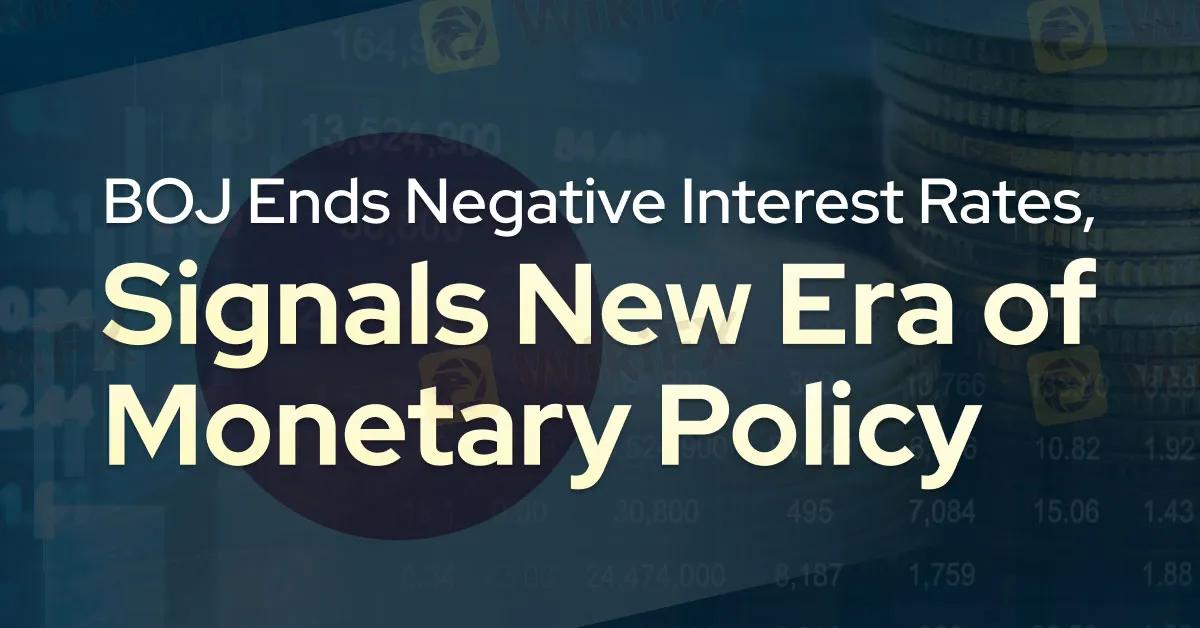简体中文
繁體中文
English
Pусский
日本語
ภาษาไทย
Tiếng Việt
Bahasa Indonesia
Español
हिन्दी
Filippiiniläinen
Français
Deutsch
Português
Türkçe
한국어
العربية
BOJ Ends Negative Interest Rates, Signals New Era of Monetary Policy
Abstract:The Bank of Japan (BOJ) announced a pivotal shift in monetary policy, ending its eight-year practice of negative interest rates and signalling Japan's first interest rate hike in nearly two decades, amidst a cautious approach to economic recovery and global monetary trends, impacting investor sentiment and currency dynamics.

The Bank of Japan (BOJ) declared a significant policy shift on Tuesday, announcing the cessation of its eight-year practice of implementing negative interest rates and winding down its extraordinary measures designed to stimulate economic growth. This change represents Japan's first interest rate hike in nearly two decades, reflecting a cautious approach to monetary policy amid a gradual economic recovery.
BOJ's decision places Japan as the last major central bank to depart from negative interest rates, marking the end of a global trend where economies benefited from low-cost capital and innovative financial strategies.
During a post-decision press briefing, BOJ Governor Kazuo Ueda explained that the bank is transitioning back to a standard monetary policy focusing on short-term interest rates, aligning with the practices of other central banks. Ueda also hinted at the possibility of further adjustments to interest rates if inflation trends upwards, refraining from specifying the timing or extent of potential rate hikes.

In a widely anticipated move, the BOJ abandoned a policy introduced in 2016 under former Governor Haruhiko Kuroda, which imposed a 0.1% fee on certain surplus reserves held by banks with the central bank. Instead, the BOJ has now designated the overnight call rate as its primary policy rate, maintaining it within a range of 0-0.1%, partially achieved by offering 0.1% interest on central bank deposits.
Frederic Neumann, HSBCs chief Asia economist, noted that the BOJ's departure from negative interest rates marks the beginning of its normalization of monetary policy, indicating the bank's confidence in Japan's transition away from deflationary pressures.
The central bank also abandoned its yield curve control (YCC) strategy, which had kept long-term interest rates close to zero since 2016, and ceased its purchases of high-risk assets.
Despite these changes, the BOJ intends to continue purchasing substantial amounts of government bonds and is prepared to increase these purchases should bond yields rise sharply, signalling its commitment to preventing a sudden spike in borrowing costs. The central bank's statement emphasized its intention to maintain “accommodative financial conditions” for the foreseeable future.
Following the announcement, Japanese stock prices rose, while the yen weakened against the dollar, with investors interpreting the BOJ's cautious stance as suggesting that the interest rate differential between Japan and the United States would remain significant.

Disclaimer:
The views in this article only represent the author's personal views, and do not constitute investment advice on this platform. This platform does not guarantee the accuracy, completeness and timeliness of the information in the article, and will not be liable for any loss caused by the use of or reliance on the information in the article.
Read more

Webull Launches SMSF Investment Platform with Zero Fees
Webull introduces commission-free SMSF trading, offering over 3,500 US and Australian ETFs, with no brokerage fees and enhanced portfolio tools.

How Will the Market React at a Crucial Turning Point?
Safe-haven assets like gold and U.S. Treasuries are surging, while equities face mounting pressure. As this pivotal moment approaches, how will the market react?

Gold Prices Climb Again – Have Investors Seized the Opportunity?
Gold prices have hit record highs for three consecutive days, with a remarkable 19% gain in the first quarter, marking the strongest quarterly performance since 1986. As market risk aversion rises, demand for gold has surged significantly.

HTFX Spreads Joy During Eid Charity Event in Jakarta
On March 14, HTFX showcased its deep commitment to social responsibility by hosting a heartwarming Eid charity event in Jakarta, Indonesia. This meaningful gathering aimed to convey warmth and care through practical actions, uniting the local community and making a significant impact on those in need.
WikiFX Broker
Latest News
How Crypto Trading Transforms FX and CFD Brokerage Industry
FCA Warns Against 10 Unlicensed or Clone Firms
CySEC Warns Against 14 Unlicensed Investment Websites
Top Currency Pairs to Watch for Profit This Week - March 31, 2025
Will natural disasters have an impact on the forex market?
Philippines Deports 29 Indonesians Linked to Online Scam Syndicate in Manila
Exposing the Top 5 Scam Brokers of March 2025: A Closer Look by WikiFX
Gold Prices Climb Again – Have Investors Seized the Opportunity?
Webull Launches SMSF Investment Platform with Zero Fees
Australian Regulator Warns of Money Laundering and Fraud Risks in Crypto ATMs
Currency Calculator







